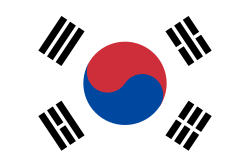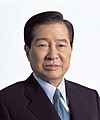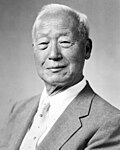
Back بوابة:كوريا الجنوبية Arabic Portal:Cənubi Koreya Azerbaijani دەروازە:کۆریای باشوور CKB Portal:Corea del Sur Spanish Portail:Corée du Sud French Portal:Korea Selatan ID Portale:Corea del Sud Italian 포털:대한민국 Korean Portal:Coreia do Sul Portuguese ද්වාරය:දකුණු කොරියාව Singhalese
 |
환영합니다! / Welcome To The South Korea Portal!  South Korea, officially the Republic of Korea (ROK), is a country in East Asia. It constitutes the southern half of the Korean Peninsula and borders North Korea along the Korean Demilitarized Zone, with the Yellow Sea to the west and the Sea of Japan to the east. Like North Korea, South Korea claims to be the sole legitimate government of the entire peninsula and adjacent islands. It has a population of 51.71 million, of which half live in the Seoul Metropolitan Area, the ninth most populous metropolitan area in the world; other major cities include Busan, Daegu, and Incheon. The Korean Peninsula was inhabited as early as the Lower Paleolithic period. Its first kingdom was noted in Chinese records in the early seventh century BCE. From the mid first century BCE, various polities consolidated into the rival kingdoms of Goguryeo, Baekje, and Silla, with the lattermost unifying the peninsula for the first time in the late seventh century CE. The Goryeo dynasty (918–1392) achieved lasting unification and established the basis for modern Korean identity. The subsequent Joseon dynasty (1392–1897) saw the height of cultural, economic, and scientific achievement as well as prolonged peace and isolationism from the mid 17th century. The succeeding Korean Empire (1897–1910) sought modernization and reform by was annexed in 1910 into the Empire of Japan. Japanese rule ended following Japan's surrender in World War II, after which Korea was divided into two zones: a northern zone, which was occupied by the Soviet Union, and a southern zone, which was occupied by the United States. After negotiations on reunification failed, the southern zone became the Republic of Korea in August 1948, while the northern zone became the communist Democratic People's Republic of Korea the following month. In 1950, a North Korean invasion triggered the Korean War, one of the first major proxy conflicts of the Cold War, which saw extensive fighting involving the American-led United Nations Command and the Soviet-backed People's Volunteer Army from China. The war ended in 1953 with an armistice but no peace treaty, leading to the ongoing Korean conflict, and left three million Koreans dead and the economy in ruins. South Korea endured a series of dictatorships punctuated by coups, revolutions, and violent uprisings, but also experienced a soaring economy and one of the fastest rises in average GDP per capita, leading to its emergence as one of the Four Asian Tigers. The June Democratic Struggle of 1987 ended authoritarian rule and led to the establishment of the current Sixth Republic. (Full article...) Selected article -Sun Myung Moon (Korean: 문선명; Hanja: 文鮮明; born Moon Yong-myeong; 6 January 1920 – 3 September 2012) was a Korean religious leader, also known for his business ventures and support for conservative political causes. A messiah claimant, he was the founder of the Unification Church, whose members consider him and his wife Hak Ja Han to be their "True Parents", and of its widely noted "Blessing" or mass wedding ceremonies. The author of the Unification Church's religious scripture, the Divine Principle, was an anti-communist and an advocate for Korean reunification, for which he was recognized by the governments of both North and South Korea. Businesses he promoted included News World Communications, an international news media corporation known for its American subsidiary The Washington Times, and Tongil Group, a South Korean business group (chaebol), as well as other related organizations. Moon was born in what is now North Korea. When he was a child, his family converted to Christianity. In the 1940s and 1950s, he was imprisoned multiple times by the North and South Korean governments during his early new religious ministries, formally founding the Holy Spirit Association for the Unification of World Christianity, simply known as the Unification Church, in Seoul, South Korea, in 1954. The Unification Church teaches conservative, heterosexual family-oriented values from new interpretations of the Christian Bible mixed with theology from Moon's own text, the Divine Principle. In 1971, Moon moved to the United States and became well known after giving a series of public speeches on his beliefs. In the 1982 case United States v. Sun Myung Moon, he was found guilty of willfully filing false federal income tax returns and sentenced to 18 months in federal prison. His case generated protests from clergy and civil libertarians, who said that the trial was biased against him. (Full article...) Selected image South Korea is located in East Asia, on the southern half of the Korean Peninsula jutting out from the far east of the Asian land mass. The only country with a land border to South Korea is North Korea, lying to the north with 238 kilometres (148 mi) of border running along the Korean Demilitarized Zone. South Korea is mostly surrounded by water and has 2,413 kilometres (1,499 mi) of coast line along three seas; to the west is the Yellow Sea, to the south is the East China Sea, and to the east is the East Sea. Geographically, South Korea's land mass is approximately 100,032 square kilometres (38,623 sq mi). 290 square kilometres (110 sq mi) of South Korea are occupied by water. The approximate coordinates are 37° North, 127° 30 East. Notable islands include Jeju Island (Jejudo), Ulleung Island (Ulleungdo), and Liancourt Rocks (Dokdo). More did you know -
In the news
This is a Good article, an article that meets a core set of high editorial standards.
Snuppy (Korean: 스너피, romanized: Seuneopi, a portmanteau of "SNU" and "puppy"; April 24, 2005 – May 2015) was an Afghan hound, the first dog clone. The puppy was created using a cell from an ear from an adult Afghan hound and involved 123 surrogate mothers, of which only two produced pups (Snuppy being the sole survivor). The Department of Theriogenology and Biotechnology at Seoul National University, which cloned Snuppy, was led by Woo Suk Hwang. Snuppy has since been used in the first known successful breeding between cloned canines after his sperm was used to artificially inseminate two cloned females, which resulted in the birth of 10 puppies in 2008. In 2017, 4 clones of Snuppy were made by Sooam, and were the first clones made of a cloned dog, to investigate potential health effects of cloning. (Full article...) General images -The following are images from various South Korea-related articles on Wikipedia.
Did you know (auto-generated)
WikiProjectsSee WikiProject Korea for collaborating on South Korea topics, and more broadly, on all things Korea-related. South Korea topics
CategoriesAdministrative divisions of South Korea
Related portalsEast Asia Associated WikimediaThe following Wikimedia Foundation sister projects provide more on this subject:
Web resources
SourcesDiscover Wikipedia using portals
|























































